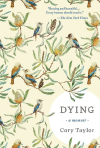Cancer memoirs come in a variety of literary styles and voices. Not surprisingly, the most poignant cancer memoirs are by those who are writing, in essence, their final words before departing this earth. The most widely read of that variety has been the beautifully written best seller When Breath Becomes Air, an enduring memoir of courage, anger, and acceptance by Paul Kalanithi, MD, a neurosurgeon who died of lung cancer at age 37. This was followed by The Bright Hour, whose author, Nina Riggs, a devoted wife and mother of two boys, died of breast cancer at age 39, shortly before her book was published.

'Monstrous Silence'
ANOTHER SUCH ACCOUNT, called Dying: A Memoir, although less noted than the aforementioned works, is perhaps the best in this genre. The author, Cory Taylor, an Australian who wrote two celebrated novels, Me and Mr. Booker and My Beautiful Enemy, died of melanoma-related brain cancer at age 60. She left behind a short, powerful, and clear-eyed account of her sad and courageous journey to death.
The writing is precise, and the author does not embark on a spiritual journey or set herself up as a kind of guru. It is Ms. Taylor’s lack of a shred of self-righteousness that gives her book its very special resonance. In short, she normalizes death with her dazzling matter-of-factness as she explores the “monstrous silence” of facing one’s mortality in the mirror every morning.
BOOKMARK
- Title: Dying: A Memoir
- Author: Cory Taylor
- Publisher: Tin House Books
- Publication Date: August 2017
- Price: $18.95, hardcover; 152 pages
As a novelist, Ms. Taylor knew the importance of an arresting opening. She wrote, “About two years ago I bought a euthanasia drug online from China. You can get it that way, or you can travel to Mexico or Peru and buy it over the counter from a vet. Apparently you just say you need to put down a sick horse and they’ll sell you as much as you want. Then you either drink it in your Lima hotel room and let your family deal with the details of shipping your remains home, or you smuggle it in your luggage for later use.… I chose the China option.”
‘Sad Beyond Belief’
ALTHOUGH THE AUTHOR, in her bracing opening paragraph, announces that she has purchased a drug she plans to end her life with, she never does. Having that option, though, is important to her, which is an important subject in and of itself.
In 2005, just before her 50th birthday, a doctor removed a mole on the back of her leg, which revealed a diagnosis of stage IV melanoma. Her “fairly leisurely approach to life” was changed in a heartbeat. She takes the prognosis with a kind of stiff-upper-lip attitude, but the reader should not draw conclusions too soon. Ms. Taylor is scared and no new Zen observations about life and death appear. Some in her position, as a means of soul-soothing justification, have written that cancer blessed them with renewed understanding about the importance of living in the moment. Not Ms. Taylor. Dying simply sharpened her view about dying: “There is nothing good about dying. It is sad beyond belief.”
“The writing is precise, and the author does not embark on a spiritual journey or set herself up as a kind of guru. It is Ms. Taylor’s lack of a shred of self-righteousness that gives her book its very special resonance.”— Ronald Piana
Tweet this quote
But she puts that terribly melancholy sentence into beautiful perspective soon after by writing, “The problem with reverie is that you always assume you know how the unlived life turns out. And it is always a better version of the life you’ve actually lived. The other life is more significant and more purposeful. It is impossibly free of setbacks and mishaps.”
Soon after her grim prognosis, the author joins the local chapter of Exit International in her home of Brisbane, Australia. These simple gatherings of people sharing a common bond—imminent death and a desire to cheat the Grim Reaper—are some of the book’s most poignant sections. Ms. Taylor wrote, “It might be any meeting of any common interest group … except that, after the tea-break, it’s back to rating cyanide and nitrogen gas according to ease of use, and speed.”
‘Fade to Black’
BRIEF FLASHES of the poet-philosopher—which she lets out sparingly—enhance her story, giving her voice more gravitas. Her story is also densely packed with personal drama and great family lore from the Outback. She imagines for the reader a provocative universe, one lying between life and death, ending with this:
If I were writing my death scene for a film, my very last moments would go something like this. A montage. Shaky, over-exposed home-movie footage of a girl with a dog in dappled sunshine, a car speeding down a dusty road, the same girl on a beach with palm trees, arm in arm with her mother in some outback moonscape, crossing the tarmac at an airport with a silver jet in the background. The jet takes off. A kookaburra sits on a branch laughing. A kink slinks away under cover. Fade to black.
Before this stunning denouement, the author writes that most of all she will miss her husband and the faces of her children. They will surely miss her, too. But the book she has left behind is precious and will live on for a long, long time. This book is highly recommended for readers of The ASCO Post. ■

